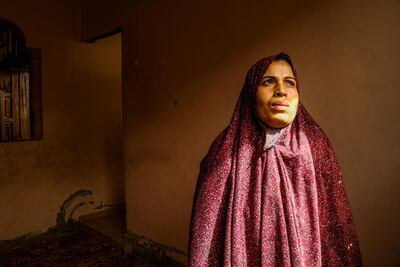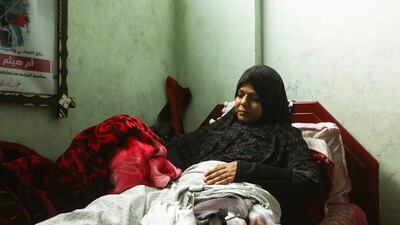Lying in her bed, in the dim light of the living room, Malina Al Hindi lifts a thick red blanket to reveal a leg studded with metal rods. The yellowed bandages have a foul smell.
"I was close to the security fence. We were surrounded by tear gas, so I tried to leave. That's when I was shot," Ms Al Hindi, 34, tells The National from her home of Khan Younis, in the southern Gaza Strip.
The mother of six sons was maimed on March 8: International Women's Day.
That Friday, Ms Al Hindi was taking part in another of the protests held by Gazans each week since March 30, 2018, at the perimeter fence with Israel.
The Great March of Return, as the demonstrations are called, demand an end to the 12-year Israeli blockade of the enclave and the right of Palestinians return to the lands they or their parents fled or were evicted from when the state of Israel was founded in 1948.
"I cannot move. Even going to the bathroom is complicated," Ms Al Hindi says, with two of her boys beside her.
"I do not know how to take care of my children any more and I am afraid I am putting their future at risk."
But she has no regrets: "The Israeli blockade affects everyone in Gaza, but the men can leave the house and change their minds.
"Women must stay at home. So when the fridge is empty and the electricity is cut, it's me who suffers.
"Women are more affected than men by the circumstances. With these marches, I found a way out."
A year into the weekly marches, Gaza's trapped civilians have suffered a harrowing toll. The UN estimates that nearly 200 have been killed and 30,000 injured, including 25 per cent wounded by live ammunition.
Israeli snipers often aim for the lower limbs of demonstrators, causing crippling injuries.
A UN inquiry suggests Israeli soldiers may have committed war crimes during the protests.
Israel says it has a right to self-defence and accuses Hamas, the militants running the enclave, of organising violent riots.

Last Saturday, on the first anniversary of the marches, tens of thousands of Gazans converged on the buffer zone with Israel. Clashes with Israeli soldiers killed four Palestinians and wounded hundreds, but the day passed without a much-feared escalation.
On the Malaka plain, on the north-eastern border of Gaza, many of the young protesters had been wounded in earlier demonstrations. Beneath the rain and tear gas, the crutches of a crippled generation slipped in the mud.
Others, though, refuse to mark the anniversary.
“I don't go any more,” says Mohammed, 28, a cigarette seller. “It's useless. My brother had a leg amputated.
"For now, there is no hope things will get better. So many young men have been injured. Everywhere you go you see people with crutches.”
Only about six per cent of the 16,027 Palestinians admitted to hospital after being wounded at protests this year were women, the Hamas-run Ministry of Health reports. But considering the indirect consequences, women have suffered disproportionately.
The consequences of a wound are often more serious for women. Girls with a serious injury may find their chances of marrying diminished, which can be a source of great shame in Gaza's conservative society.
In other cases, women have refrained from receiving medical treatment to avoid tension with their husbands or family, who might disapprove of them going to the protests, the UN Population Fund says.
And the huge number of people wounded since the start of the demonstrations has forced hospitals to release patients prematurely. The burden of caring for injured men fell on their mothers and wives, in addition to their normal household chores.
Frustration and anger has led to rising tension in the home. Local organisations dedicated to protecting women have received twice as many cases of gender-based violence in the past year, compared to 2017.
"Our society lives under Israeli occupation, but it is also male-dominated and conservative," says Hana Zant, a research co-ordinator at the Women's Affairs Centre in Gaza.
"That cocktail explains why most women here face abuse. We have cases where the husband blames his wife for letting the children attend the march, where they were injured."
In other instances, wounded men vent their anger on their spouses.
"I also met a lady whose husband was wounded in both legs and was lashing out at her, beating her with his crutches and insulting her," Ms Zant says.
In extreme cases, women who have been injured find themselves without support. Ms Zant tells a young woman whose husband left her after she was injured, and whose family reject her because she is disabled. “Today, she is a broken person.”
When women lose husbands, they may be exposed to social and economic hardship, as it is the family of the deceased who control his assets. Young girls in families who lost a breadwinner face a higher risk of child marriage, the UN agency says.
"The protracted crisis Palestinian people live in affects women differently and disproportionately," says Osama Abueita, head of the agency in Gaza.
"That is something that is often overlooked. For the moment, everyone is focused on gunshot wounds. We are trying to attract donors' attention to these issues but it's not easy."
For women such as Sawsan Ayish, the disinterest of foreign donors is felt daily. On May 14 her husband left home to sell ice creams at the protests as he did every Friday. Like sixty other Palestinians that day, he did not return.
Ms Ayish and her four children now live in poverty in a small flat in a working-class district of Gaza City. Portraits of her deceased husband adorn the walls of each room. Most of the windows have been broken since the 2014 war.
"The kids and I survive day by day,” she says. “I go to the market once a week. Sometimes I do not cook, I just fry potatoes. We have rats and when it rains the apartment leaks."
Ms Ayish gives a sad smile and pauses before continuing.
"Before the death of my husband I managed the situation with him. Now I suffer alone."

